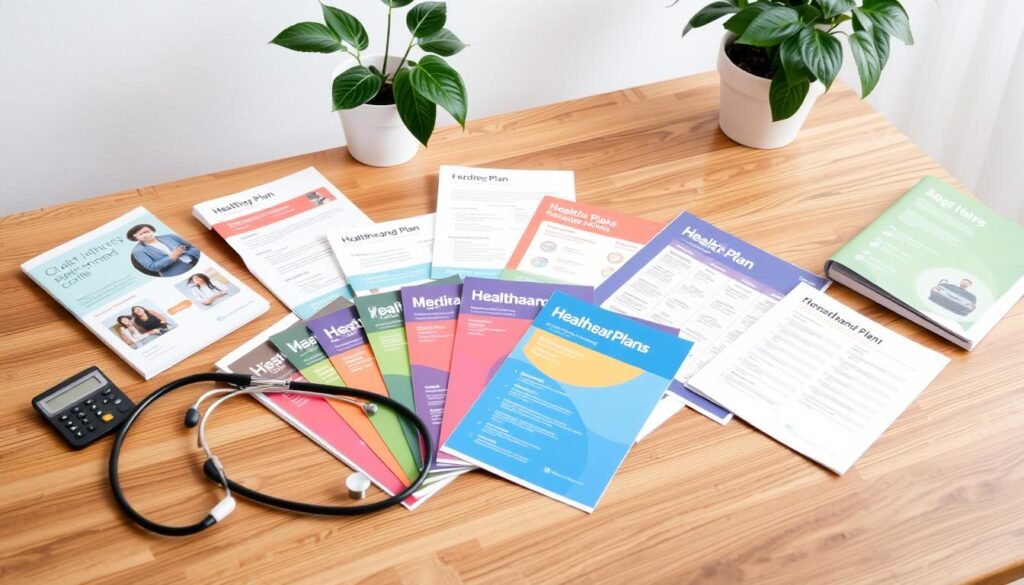Did you know over 55 million Americans depend on Medicaid for healthcare? This figure highlights the vital role health insurance has in our lives. Whether you’re dealing with the Affordable Care Act, looking to enhance your current coverage, or searching for family plans, the right health insurance is crucial. It impacts your health and financial stability greatly.
This guide aims to equip you with the knowledge and tools for making informed health insurance choices. We’ll delve into the differences between HMO and PPO plans, and explore Medicare and Medicaid options. Our goal is to help you find the best coverage for your specific needs.
Key Takeaways
- Understand the various types of health insurance plans and their key features
- Learn how to compare healthcare plans and provider networks to find the best fit
- Discover strategies to navigate premium costs and reduce your overall healthcare expenses
- Identify essential benefits and coverage features to look for when selecting a plan
- Gain insights on evaluating insurance providers and reviewing your coverage regularly
Understanding Health Insurance Basics and Coverage Types
Exploring the complex world of health insurance requires a deep understanding of various coverage types. From traditional policies to managed care, the health benefits landscape can seem overwhelming. However, with the right knowledge, you can choose a plan that meets your healthcare needs.
HMO vs. PPO Plans: Which Is Right for You?
Health Maintenance Organization (HMO) and Preferred Provider Organization (PPO) plans are common in health insurance. HMOs often have lower premiums but limit your choice of healthcare providers. On the other hand, PPOs offer more flexibility but may increase your out-of-pocket costs. Assessing your healthcare needs, budget, and access to providers is key to selecting the right plan.
Essential Coverage Components to Consider
- Inpatient and outpatient hospital services
- Physician and specialist visits
- Preventive care, such as annual checkups and screenings
- Prescription drug coverage
- Emergency and urgent care services
Medicare and Medicaid Options Explained
For those who qualify, Medicare and Medicaid offer vital health benefits and managed care options. Medicare serves individuals aged 65 and older, while Medicaid aids low-income families and individuals. Knowing the eligibility and coverage specifics of these insurance policies can help you decide if they suit your healthcare needs.
“Health insurance is not just a luxury, but a necessity in today’s world. Investing in the right coverage can provide peace of mind and financial protection when you need it most.”
How to Compare Healthcare Plans and Provider Networks
Understanding healthcare plans and provider networks can be overwhelming. Yet, with a strategic approach, you can discover the perfect medical coverage for you. Here’s a detailed guide to effectively compare healthcare plans and provider networks.
First, grasp the distinctions between healthcare plans like HMOs, PPOs, and EPOs. Each plan offers unique benefits, limitations, and costs. It’s vital to assess which plan matches your healthcare needs and budget.
Then, delve into the provider networks of each plan. Make sure your preferred doctors, including your primary care physician and specialists, are in-network. This significantly influences your costs and coverage.
- Identify your healthcare needs: Reflect on your current and future medical needs, including chronic conditions, routine checkups, or specialized treatments.
- Research plan options: Compare the coverage, network, and costs of different healthcare plans to find the best match.
- Assess provider networks: Confirm that your preferred doctors and hospitals are part of the plan’s provider networks.
- Evaluate plan features: Examine deductibles, copays, and out-of-pocket maximums to grasp the plan’s total cost.
- Consider plan flexibility: Determine if the plan allows out-of-network visits and its impact on your coverage and costs.
By following these steps, you can make an informed choice about your medical coverage. Select a healthcare plan that balances quality, cost, and access to your preferred providers.
“The right healthcare plan is crucial for your well-being and financial security. Take the time to compare your options and find the coverage that truly meets your needs.”

Comparing Plan Features and Benefits
When evaluating healthcare plans, focus on the specific features and benefits each offers. Consider factors such as:
- Deductibles: The amount you must pay out-of-pocket before the plan covers your expenses.
- Copays: The fixed amount you pay for certain services, like doctor visits or prescription drugs.
- Coinsurance: The percentage of costs you share with the plan after meeting the deductible.
- Out-of-pocket maximums: The maximum amount you’ll have to pay for covered services in a given year.
Understanding these key plan features helps you estimate your healthcare costs. Choose the option that best aligns with your budget and healthcare needs.
Navigating Premium Costs and Health Insurance Pricing
Understanding the cost of health insurance is crucial when selecting the right coverage plan. Premium costs, deductibles, and copays are key factors that determine the overall affordability of your healthcare expenses. Familiarizing yourself with these financial aspects can help you make an informed decision and ensure you get the most value for your money.
Understanding Deductibles and Out-of-Pocket Maximums
A deductible is the amount you must pay out-of-pocket for healthcare services before your insurance plan starts to cover the expenses. Out-of-pocket maximums, on the other hand, cap the total amount you’ll have to pay for covered services in a given year. Comparing these features across different plans can help you find the right balance between coverage and affordability.
Tips for Calculating Total Healthcare Expenses
- Estimate your anticipated medical needs, including routine checkups, prescriptions, and potential emergency care
- Factor in the premium costs of your plan, as well as any deductibles and copays you may incur
- Consider your eligibility for subsidies or other financial assistance programs
Ways to Reduce Your Insurance Costs
- Opt for a higher deductible plan with lower premium costs if you are generally healthy and want to save on monthly payments
- Take advantage of employer-sponsored or group health insurance plans, which often offer more affordable premium costs
- Explore HSA (Health Savings Account) or FSA (Flexible Spending Account) options to set aside pre-tax dollars for healthcare expenses
By understanding the financial aspects of health insurance and exploring cost-saving strategies, you can make more informed decisions about your coverage. This ensures that you get the best value for your healthcare needs.

Essential Benefits and Coverage Features to Look For
Choosing the right health insurance policy requires focusing on key benefits and coverage features. These elements should match your healthcare needs. Understanding a comprehensive insurance plan’s components is crucial. It helps you make an informed choice and ensures you get the best value for your money.
Preventive care coverage is a vital aspect to consider. Look for plans that offer free or low-cost access to routine check-ups, screenings, and immunizations. These services are essential for maintaining your health and catching potential issues early. Medical coverage for prescription drugs is also crucial, as medication costs can quickly become overwhelming.
- Comprehensive coverage for essential health benefits, such as doctor visits, hospital stays, and emergency services
- Accessibility to a wide network of healthcare providers, including specialists, to ensure you have options that suit your needs
- Mental health and substance abuse treatment coverage, as these services are increasingly becoming recognized as vital components of overall well-being
By carefully evaluating health benefits and insurance coverage features, you can find a plan that meets your current healthcare needs. It should also offer flexibility to adapt to your changing needs over time. Investing time to understand different policy options can greatly benefit you in the long run. It ensures you have the medical coverage needed to maintain your health and well-being.
Making Informed Decisions About Your Medical Coverage
Choosing the right healthcare plan can seem overwhelming. However, with the right information, you can make a choice that fits your needs. When evaluating insurance providers, consider customer satisfaction, financial stability, and the network of providers they offer.
Evaluating Insurance Providers and Their Reputation
Research the insurance company’s history, ratings, and reviews from trusted sources. Look for providers known for excellent customer service, claims handling, and quality coverage. This will help you find reliable and trustworthy options for your healthcare needs.
Understanding Policy Terms and Conditions
Thoroughly review any healthcare plan or insurance policy you’re considering. Make sure you understand the coverage limits, deductibles, copays, and out-of-pocket maximums. Also, pay attention to any exclusions or limitations that could impact your access to health benefits.
When to Review and Update Your Coverage
- Regularly review your healthcare plans and insurance policies, especially during open enrollment periods or when you experience a major life event, such as getting married, having a child, or changing jobs.
- Consider updating your coverage if your health needs or financial situation have changed, or if you’ve found a more suitable plan that better fits your requirements.
- Stay informed about any changes to your existing plans, such as updates to provider networks, coverage changes, or premium adjustments.
By thoroughly evaluating your options and understanding your healthcare plans and insurance policies, you can make informed decisions. This ensures you have the best coverage for your needs and budget. It helps you maintain your health and well-being.
Conclusion
As we wrap up this detailed guide on health insurance, it’s crucial to highlight the importance of understanding your choices. Whether you’re looking into HMO, PPO, Medicare, or Medicaid plans, it’s vital to assess each option carefully. This evaluation should be based on your unique healthcare needs, budget, and the coverage aspects that are most important to you.
In this article, we’ve shared a wealth of information to guide you through the complex health insurance landscape. We’ve covered the basics of coverage types, compared premium costs, and discussed essential benefits. Our aim has been to equip you with the knowledge needed to find the right medical plan for your specific needs. Remember, the right health insurance offers invaluable peace of mind and financial security, making it worth the effort to explore and compare different plans.
As you continue your search for the best health insurance coverage, we urge you to use the resources and insights we’ve provided. By thoroughly understanding your options, weighing the costs against the coverage, and prioritizing your healthcare needs, you’ll be on the path to finding the perfect fit for your medical insurance needs. We wish you success in your quest for comprehensive and affordable health coverage.
